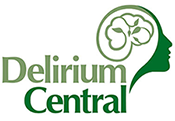About Delirium

What is delirium?
Delirium (or acute confusion) is a sudden change in mental status, or sudden confusion, which develops over hours or days. It is different from dementia, such as Alzheimer’s disease, which is a chronic state that progresses over time. In general, delirium is a short-term condition. Delirium is sometimes called “acute brain failure” because of its sudden and dramatic onset. The exact pathogenesis of delirium remains unclear.
Fong TG, Tulebaev SR, Inouye SK. Delirium in elderly adults: diagnosis, prevention and treatment. Nat Rev Neurol. 2009;5(4):210-220. doi:10.1038/nrneurol.2009.24
What are the features of delirium?
Delirium makes paying attention or focusing difficult, and sometimes affects the ability to maintain awareness of one’s surroundings. Some people hallucinate or become paranoid because it becomes difficult to interpret their environment. Other symptoms may include rambling speech and jumbled thoughts. These symptoms tend to come and go during the course of the day. Confusion regarding day-to-day events, daily routines, and the roles of familiar people is common. Changes in personality can occur. Some persons become quiet and withdrawn while others become agitated or hyperactive. Normal patterns of sleeping and eating are often disrupted.
Inouye SK, Van Dyck CH, Alessi CA, Balkin S, Siegal AP, Horwitz RI. Clarifying confusion: The Confusion Assessment Method. A new method for detection of delirium. Ann Intern Med. 1990; 113:941‑8.
How do you recognize delirium?
- The Confusion Assessment Method (CAM) is the most widely used, standard tool for identification of delirium
- The four major CAM criteria are:
- acute onset fluctuating and course – and –
- inattention – and either –
- disorganized thinking – or –
- altered level of consciousness
- The CAM is rated by a clinical or trained lay interviewer on the basis of an interview with the patient that includes at least a brief cognitive assessment (i.e., the SPMSQ or Modified Mini-Cog Test).
The Confusion Assessment Method, ©2003, Hospital Elder Life Program. Inouye SK, et. al. Ann Intern Med. 1990, 113: 941-8
Why delirium is important
Delirium is Common
Recent studies indicate that delirium is common for older persons in the hospital setting, with occurrence rates ranging from 29-64%.
Marisa Wan, MD, FRCPC Jocelyn M. Chase, MD, FRCPC, Delirium in older adults: Diagnosis, prevention, and treatment, Issue: BCMJ, vol. 59 , No. 3 , April 2017 , Pages 165-170
Other high-risk settings including:
- Postoperative: 12-51%
- Intensive care: 19-82%
- Nursing home: 20-56%
- Palliative care: 47%
- Stroke units: 27%
- Emergency room: 8-17%
Hshieh TT, Inouye SK, Oh ES. Delirium in the Elderly. Clin Geriatr Med. 2020 May;36(2):183-199
Delirium has serious complications
Delirium is associated with:
- Increased morbidity and mortality
- Functional and cognitive decline
- Increased rates of dementia
- Institutionalization
- Increased healthcare utilization and costs
- Post-traumatic stress disorder
- Caregiver burden
Adverse outcomes with delirium
| Outcomes | Adjusted Relative Risk |
|---|---|
| Prolonged length of stay | 1.4 – 2.1 |
| Mortality | 1.5 – 1.6 |
| Institutionalization | 2.5 |
| Functional decline | 1.5 |
| Cognitive decline/Dementia | 6.4 – 41.2 |
Inouye SK, Westtendrop RGJ, Saczynski JS. Delirium in elderly people. The Lancet 2014;383:911-22
The table above shows the higher risk of adverse outcomes associated with delirium. For example, older adults who experience delirium are 1.4–2.1 times more likely to have prolonged length of hospital stay compared to those without delirium. Older adults with delirium are also at higher risk for mortality, institutionalization, functional decline, and cognitive decline/dementia.
Delirium is expensive
Delirium costs Medicare about $164 billion (2011 US dollars) and more than $182 billion (2011 Euros in 18 European countries) per year, attributed to:
- Hospital costs (> $11 billion/year US)
- Post-hospital costs for all older medical patients (>$153 billion/year US) and for older elective surgery patients (>$33 billion/year US)
- Rehospitalization
- Emergency department visits
- Institutionalization
- Rehabilitation
- Formal home care services
- Caregiver burden when patients are able to return home
- With the world’s population aging, delirium is a problem that will continue to increase unless we can find effective means for its prevention and treatment
Leslie DL, Marcantonio ER, Zhang Y, Leo-Summers L, Inouye SK. One-year health care costs associated with delirium in the elderly population. Arch Intern Med. 2008;168:27-32.
Gou RY, Hshieh TT, Marcantonio ER, Cooper Z, Jones RN, Travison TG, Fong TG, Abdeen A, Lange J, Earp B, Schmitt EM, Leslie DL, Inouye SK; SAGES Study Group. One-Year Medicare Costs Associated With Delirium in Older Patients Undergoing Major Elective Surgery. JAMA Surg. 2021 May 1;156(5):430-442.
Delirium is often unrecognized
Previous studies have shown that in affected persons, the delirium is only recognized by:
- About 1/3 of physicians
- About 1/3 of nurses
Ira Pastor.Mar2020. Ambassador Interviews, Biological Sciences, Featured, Health, Medicine, Science. Dr. Inouye: Delirium An Under Diagnosed Area Of Brain Aging And Degeneration. https://radioideaxme.com/2020/03/06/dr-inouye-delirium-an-under-diagnosed-area-of-brain-aging-and-degeneration/
Families can help by letting healthcare professionals know that their loved one is “not themselves.”
We can only manage delirium and decrease its complications if we can recognize it. Using a validated tool like the Confusion Assessment Method can help.
Delirium is preventable
Previous studies have shown that about 30-40% of delirium is preventable.
Siddiqi N, House AO, Holmes JD. Occurrence and outcome of delirium in medical in-patients: a systematic literature review. Age Ageing. 2006;35:350–364.
Multicomponent targeted interventions have been the most effective approaches and are broadly recommended in clinical guidelines. Delirium can be prevented in 40-50% cases.
Hshieh TT, Yang T, Gartaganis SL, Yue J, Inouye SK. Hospital Elder Life Program: Systematic Review and Meta-analysis of Effectiveness. Am J Geriatr Psychiatry. 2018;26(10):1015-1033.
Dr. Sharon K. Inouye Podcast
- Preventing hospital delirium and maintaining brain health [interview]. Better Health While Aging Podcast. April 2018; Episode 062. Available at: https://betterhealthwhileaging.net/podcast/bhwa/hospital-delirium-and-maintaining-brain-health-sharon-inouye/
- Geri-Pal: Delirium – a podcast with Dr. Sharon Inouye. May 2019. Available at: https://www.geripal.org/2019/05/delirium-podcast-with-sharon-inouye.html
- TherapyShow – a podcast with Dr. Sharon Inouye. November 2019. Available at: http://therapyshow.libsyn.com/7-dr-sharon-inouye-what-is-geriatric-therapy
- Inouye S. Aging Isn’t a Dirty Word. November 2019. Available at: http://closler.org/lifelong-learning-in-clinical-excellence/aging-isnt-a-dirty-word
- Walking Home from the ICU – a podcast with Dr. Sharon Inouye. March 2020. Available at: https://podcasts.apple.com/us/podcast/walking-home-from-the-icu/id1497431005
- IdeaxMe. Delirium: An Under Diagnosed Area of Brain Aging and Degeneration – a podcast with Dr. Sharon Inouye. March 2020. Available at: https://radioideaxme.com/2020/03/06/dr-inouye-delirium-an-under-diagnosed-area-of-brain-aging-and-degeneration/
- Neurology. An update on delirium – a podcast with Dr. Sharon Inouye. April 2020. Available at: https://www.neurology.org/podcast
- Harvard Medical School News & Events. Neither Dazed nor Confused: The stories behind geriatrician Sharon Inouye’s battle to prevent delirium. April 2020. Available at: https://hms.harvard.edu/news-events/multimedia/neither-dazed-nor-confused






